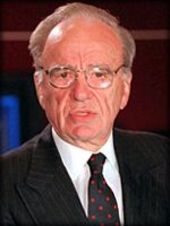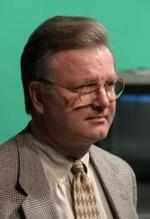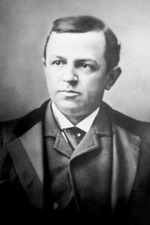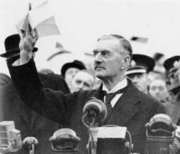Following is the essay you can designate as Volume 10, Number 50 of
This Week’s Clue, based on the e-mail newsletter I have produced since
March, 1997. It would be the issue of December 17.
Enjoy.
One hallmark of a crisis period is how it represents a change in the dominant medium.
I didn’t realize this when I started this project, two years ago. It revealed itself to me slowly. The rise of mass-market books which could impact public opinion in the 1850s. The rise of penny newspapers, organized as nationwide chains, in the 1890s. The rise of movies and radio, with all their dramatic power and immediacy, in the 1930s. The rise of TV in the 1960s.
In all these periods the older medium could not respond. It felt dominant. It had dominated a generation of thought, and the people in those media felt they could go on as before, without change. None of them noticed the new crisis. It was left to the avatars of the new media — newspaper journalists in the 1890s, movie producers in the 1930s, TV producers in the 1960s — to tell the story. And in the telling they became dominant, then over time became just as ossified, self-centered, and blind to the next crisis as those they had displaced.
So it is today. The Internet is replacing TV. You don’t see much respect for the online medium from TV people.
Here is a great example, from a man I have had casually friendly
relations with for years. David Hazinski and I both wrote for
Electronic Media in the 1990s, and he may have thought we were in
general agreement on some things. But in this piece, he goes beyond loco. He goes blind.
Education, skill and
standards are really what make people into trusted professionals.
Information without journalistic standards is called gossip.
Fine
so far as it goes, but Hazinski is demanding not only that TV and
newspapers ignore online journals, but that they hold themselves aloof,
as "professionals" with "standards."
I’ve been a "professional" with "standards" for over 30 years now. I
have worked for many journalism organizations, large and small, in a
variety of media. The "standards" of which Mr. Hazinski talks here
simply don’t exist, and probably never did.
The idea of journalism as a profession was given to me at the Medill school,
named for a publisher who used his newspaper as a bludgeon against his
political enemies for decades. The same is true for the man whose name
is on the famed school at Columbia.
Once I entered the real world I learned that all the grand talk of
"ethics" and "professionalism" taught at these schools was, frankly,
optional. The Golden Rule operated. He who had the gold made the rules.
If the owner saw himself working first for the readers, you worked for
the readers. If he saw himself as working for the advertisers, you
worked for the advertisers. If he saw himself as having a political
agenda, you had the same agenda — or you got out.
In all Mr. Hazinski’s grandiloquence on the "professional" nature of
what is, in the end, a trade, he never once mentioned Fox News, nor the
other hackeries of Mr. Rupert Murdoch, nor the corporate biases of the
rest of America’s TV and newspaper media. He certainly didn’t concern
himself with the advertiser-focus of the computer press, where I worked
for decades.
Frankly, it is this kind of sanctimony that I abhor more than
anything else. Mr. Hasinski works at the Grady School of Journalism, at
the University of Georgia. Does he know anything about Henry Grady,
after whom the school is named, and whose statue still stands in
downtown Atlanta, on Marietta Street?
Mr. Henry Grady was a booster. He was a blowhard, a Babbitt. He was
a racist. His "great" New South speech, on which his reputation rests,
said, in essence, "We still hate niggers but we’re here to do bidness."
And this was Atlanta’s motto for a century, Randy Newman’s song
"Rednecks" writ large. That’s the hero whose name is on your so-called
"professional" journalism school, Mr. Hazinski. A publisher, not a journalist. A businessman, not a professional.
There have been some great hero-journalists over the years. Ralph McGill. Jacob Riis. Ida Tarbell. H.L. Mencken. Edward R. Murrow. Jimmy Breslin. Ernie Pyle. I know my history.
You know what they all had in common, Mr. Hazinski? They fought
against their employers. They had their day, but they stood apart, and
above, from the common herd of journalists. They defied their times,
they spoke truth to power without fear or favor, and "professionally"
they suffered for it.
Today, none of these people would have a job. They’d all be bloggers. Breslin has been shuffled around from newspaper-to-newspaper so much he’d might as well be one.
In a real profession, as opposed to a trade, the great artists are
revered by the industry they serve. Great doctors are revered by the
medical industry, great lawyers are revered by the legal industry. Not
in journalism. The few, the proud, the great journalists are like
prophets, unloved in their own land, in their own time, and in the
places where they work.
So shut your yap about the "professionalism" of "professional"
journalists. Take your Steve Doocy and your Chris Matthews and your Jim
"effin" Wooten, those who have ignored the story of this era, who
either dismissed it, trivialized it, or suppressed it,
who gained great honor from their employers as a result, and shove it.
On the Internet, anyone can practice journalism. On the Internet,
every member of the audience is responsible for what they read and
write. It’s a freedom we haven’t seen in this country since its
founding. It’s brand new. I don’t know where it will lead.
But here’s the bottom line, Mr. Hazinski. You won’t be going there.
You are, and will remain, a man of the past.
And that’s a pretty good
thing. We don’t need you in the future. We need open minds.













